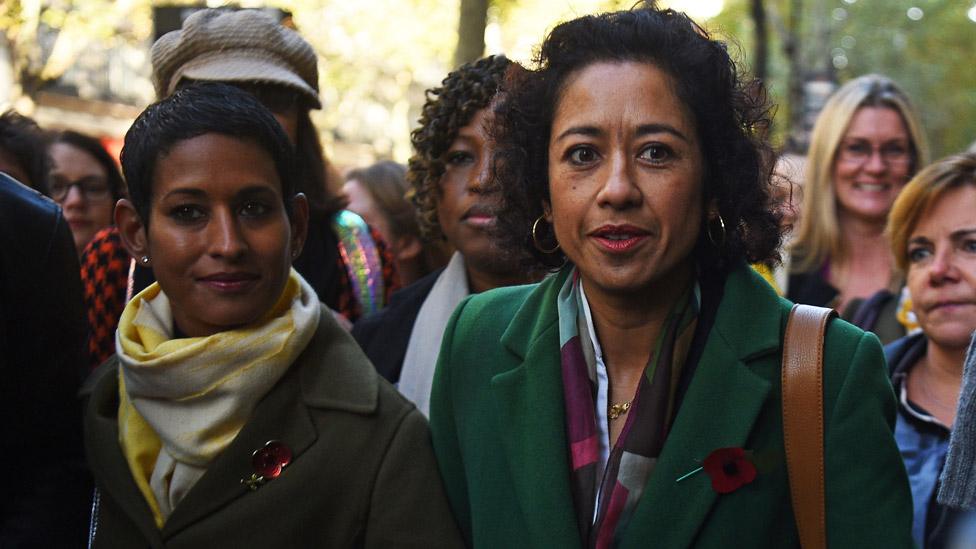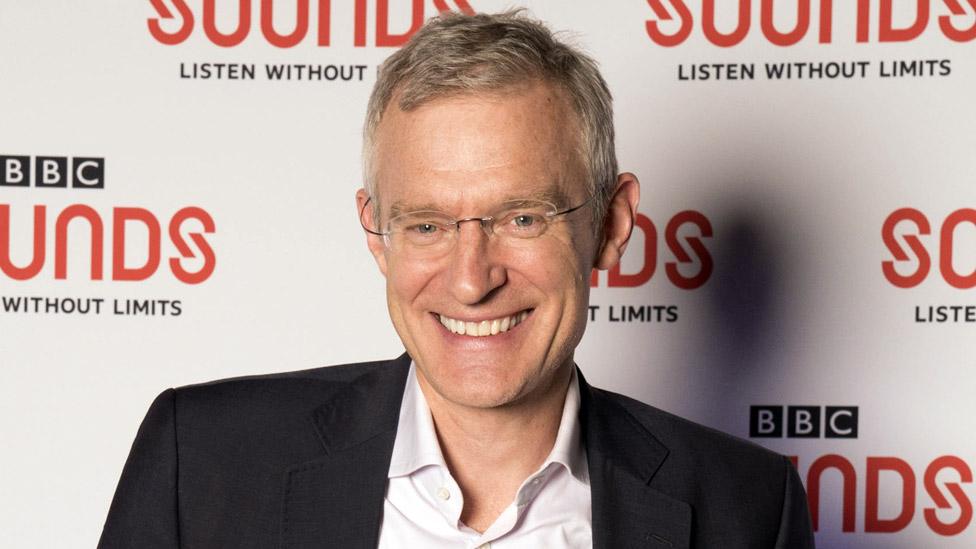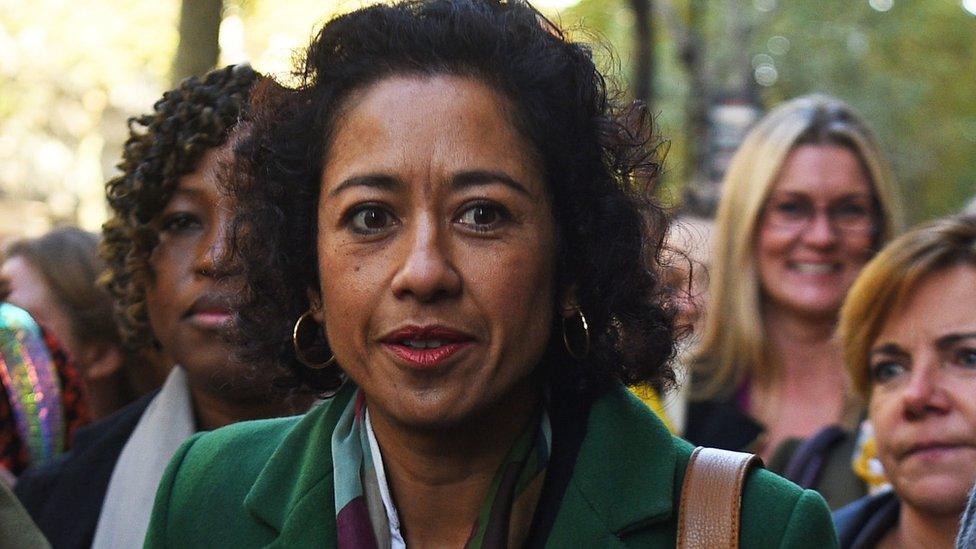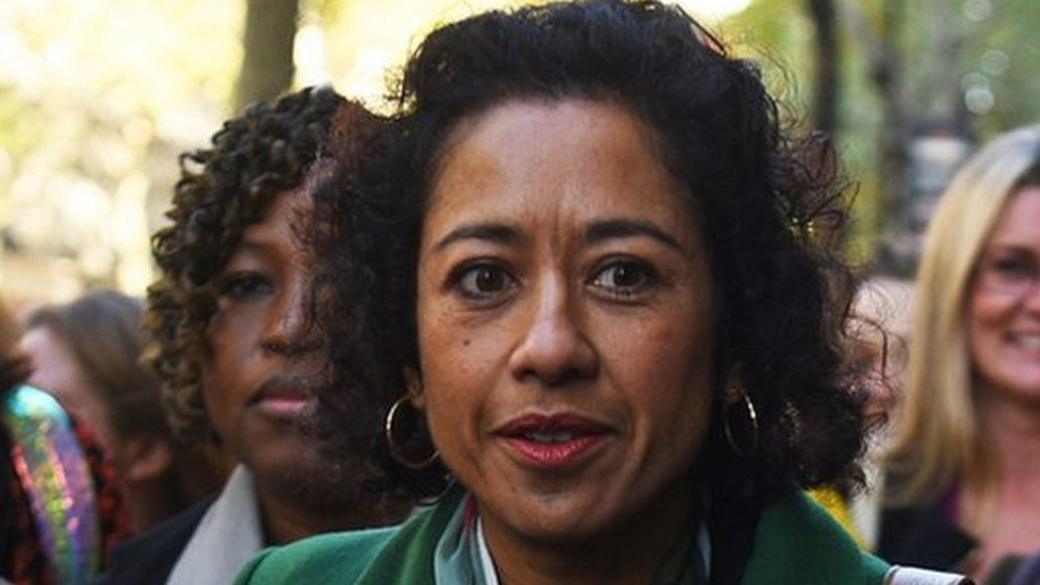Samira Ahmed's BBC equal pay tribunal ends: Who said what?
- Published

Ahmed (right) was accompanied by BBC Breakfast's Naga Munchetty on the tribunal's first day
An equal pay tribunal brought against the BBC by TV and radio presenter Samira Ahmed has ended.
Judgment has been reserved and the outcome will be published at a later date.
Ahmed claimed she was underpaid for hosting audience feedback show Newswatch when compared with Jeremy Vine's salary for Points of View.
She is seeking almost £700,000 in back pay. But the BBC said the two performed "very different roles".
He got £3,000 per episode between 2008 and 2018, compared with her £440.
Why did Samira Ahmed bring the case?
Ahmed told the tribunal, which has lasted nearly two weeks, she "could not understand how pay for me, a woman, could be so much lower than Jeremy Vine, a man, for presenting very similar programmes and doing very similar work".
In a statement, she said: "I love my job on Newswatch despite it being difficult and challenging. On the back of my BBC ID card are written the BBC values which include 'we respect each other and celebrate our diversity' and 'we take pride in delivering quality and value for money'.
"I just ask why the BBC thinks I am worth only a sixth of the value of the work of a man for doing a very similar job."

Samira Ahmed in the Newswatch studio in 2012
Ahmed also argued that she had more input into the stories and scripts on her show than Vine did in his, and her work required more preparation time. "It is likely that Jeremy Vine spends less time in make-up than I do," she said. "Women are more likely to be criticised for their appearance on air."
The journalist, who also co-hosts Radio 4 arts show Front Row, said she believed a pay cut he took in 2018 - to £1,300 per episode - was sparked by her complaint. She named Vine as her pay comparator in an email to BBC bosses in October 2017.
She added: "My issue is with the BBC, not with Jeremy Vine. I'm incredibly grateful to him as a colleague. I don't want it to be about him and I'm sorry his name has been dragged into this."
Beyond Points of View, she said she believed he had been "gifted" his Radio 2 lunchtime show in 2003, which she said "was a controversial appointment at the time and led to many complaints" because he was not known as an entertainment presenter. "Women are not gifted these opportunities," she said.
What did the BBC say?
That there is a big difference between news programmes like Newswatch and entertainment shows like Points of View.
"There is a clear distinction between the two shows, and their genres, which is reflected in their broadcasting slot and their audience," the BBC's director of strategy Gautam Rangarajan said.
One difference, he argued, was that the presenter is a lesser part of the appeal of news programmes. Newswatch required a "skilled, trained journalist", but the profile of the Points of View presenter was "more important than in news", he said.

Jeremy Vine hosted Points of View for a decade until 2018
He cited audience research carried out in 2017 that found 71% people recognised Vine, compared with 29% for Ahmed.
In 2018, the average audience for Newswatch on the BBC News Channel was 106,000, he said, while Points of View's audience was 864,000. However, Newswatch is repeated on BBC Breakfast on Saturday mornings, where it gets an average audience of 1.53 million.
The BBC's legal team said Ahmed was paid the same as her predecessor Ray Snoddy, who they said was her pay comparator, rather than Vine.
Points of View producer Simon Miller told the tribunal the show's presenter needed "a glint in your eye". They must to be able to convey a cheeky tone and strike a balance between holding the BBC to account while not being dismissive, on what is a light-hearted programme.
"Getting the right balance required care," he said. "One reason why Jeremy was so good at presenting the show was because he was able to strike that balance." His predecessors Terry Wogan and Anne Robinson had similar qualities, he added.
Newswatch series producer James Mallet said he did not expect presenters to put in significant amounts of personality for news programmes, which audiences wanted to be delivered straight.
Mr Miller said a claim by Ahmed that making Points of View "required minimal effort" from Vine was "not a fair description".
'Easy money'?
But an email from a BBC executive described the pay for Points of View as "easy money".
Jon Swain, then head of unscripted productions for BBC Studios, wrote the email to other BBC bosses in January 2018 during discussions about Vine's future pay.
He wrote: "Jeremy has been pretty understanding and indicated... that he'd want £1500 (think that's half his current rate) but hinted that he would probably settled at £1300.
"I believe stand-in presenters have been paid £1k and been very happy (it's easy money as it's so little work)."
Ahmed's closing submissions criticised the corporation's witnesses and evidence, saying it failed to call anyone who was involved in negotiating Vine's fee for Points of View.
It also said BBC witnesses "were prepared to give evidence to the ET [employment tribunal] about matters that they had little knowledge of" and that the corporation had "repeatedly sought to make other unfair comments about SA [Samira Ahmed]'s credibility".
Vine pay negotiations revealed
The tribunal also gave an insight into how contract negotiations in the TV industry work - or at least how they worked in 2007, when Vine had previously renegotiated his contract with the BBC.
Roger Leatham, director of business affairs for BBC Studios, described how Vine's agent Alex Armitage told the corporation he had been offered "close to a seven-figure amount" by ITV and wanted the BBC to come close to matching it. He said Sky and Channel 4 also wanted to offer him work.
The BBC believed Vine was one of the few presenters who appealed across entertainment, news and on radio - but the corporation was cutting budgets at the time and couldn't offer a big pay rise for his existing workload. The BBC decided the only solution was to find him more work - including daytime quiz show Eggheads and more Panorama.
However, Mr Armitage rejected the offer in what Mr Leatham described as "a rather colourful email".
"The BBC must now stop bullying this artist and pushing him around on this deal and listen to him," the agent wrote. "Stop treating him like a chattel and pay him properly... Stop treating Jeremy Vine like a child as he is sick of it now."
An extra "top-up" clause was added, guaranteeing that the BBC would find work to the value of £100,000 for Vine or make a payment of up to £100,000 if it did not.

Follow us on Facebook, external, or on Twitter @BBCNewsEnts, external. If you have a story suggestion email entertainment.news@bbc.co.uk, external.
- Published30 October 2019

- Published29 October 2019
